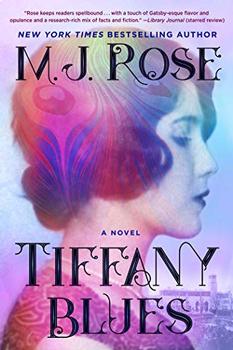Summary | Excerpt | Reading Guide | Reviews | Beyond the Book | Readalikes | Genres & Themes | Author Bio

A Novel
by M.J. Rose
Having finished critiquing Edward, Professor Pannell came to stand behind me. He hadn't yet been satisfied with anything I'd done in his class, and judging from his groan as he examined my interpretation of the pond, nothing had changed.
"Miss Bell, is that how you feel looking at the scenery?"
"It is."
"Then, Miss Bell, look harder. Examine Miss Deering's work. Note the colors she's used. Even with the lack of dimension in her rocks, pay attention to the feelings she's expressed. Don't you realize that your determination to stick to your colorless palette restricts you? Why are you handicapping your efforts?"
I looked from my best friend's canvas back to my own. We'd both painted the same scene, but where she saw spring greening the copse to life, I saw a forest out of a Grimms' fairy tale. Woods no little girl would want to enter willingly, a foreboding waterfall from which to flee.
"Miss Bell," Professor Pannell instructed, "look at this scene, this day, this sunshine and spring. Paint how this makes you feel." He then proceeded to inspect the next student's work.
I glanced from my painting to the waterfall, pond, trees, and grass. Back to the painting. Back to the rushing water. Back to the painting. Back to the rushing water. Of course, I could see the colors, but they weren't my focus. They were a distraction from my subject. I used a monochromatic palette because I wanted to capture light, to show how it illuminated the water and shadowed the trees. I wanted to master chiaroscuro. DaVinci, Rembrandt, and Caravaggio all knew that what we see is a result of light falling against it. It's the light that matters. Without it, there would be no subject. But light was so elusive. If I could just capture that simple bit of—
Suddenly, I saw a flash of blue tumbling over the edge of the waterfall. It was clothing. Child-size.
Then a woman's high-pitched voice called out: "Jeffrey!"
"It's a child in the falls!" I cried, as I dropped my brush and my palette and ran. The water was so powerful. A child who fell in would be caught in the current of the rushing cascade. His little body would be thrown against the rocks. Unless someone reached him quickly, he might drown.
I reached the edge of the pond. I didn't know how deep the water was, but that didn't matter. If a child was in danger, if there was a life to save, I had to attempt it.
"Jeffrey, you bad boy. Look at that, your jacket is all wet!"
The voice expressed exasperation, but no panic.
A jacket?
I circled around to see a woman tugging a well-groomed Maltese on a light green leather leash. She approached the edge of the pond and looked down at the errant piece of clothing.
"Jeffrey!" she called. "Come out here and see what you did!"
With that, a little boy, about seven or eight, emerged from the woods. He stood beside her, scuffing his shoe in the dirt and looking sheepishly from the floating jacket to his mother. And then he leaned over and started to reach toward the jacket.
"No, Jeffrey! Don't. You could fall, and then you'd be all wet, too. Let's find a stick and drag it in." Before she moved away, she looked at me. "Thank you," she said.
I nodded at her and took a deep breath. Although the boy was clearly fine, my heart continued racing as I returned to my easel. I'd seen the jacket and jumped to the conclusion that a child was drowning. My vision was warped, you see. Damaged by what I had endured as a girl. By now, at age twenty-four, I had long viewed the world through one particular lens, taking in what was there and pulling out the color so I could focus on the light and how it fell and created highlights. How shadows created depth. And in the process, I never failed to notice the potential for catastrophe and heartache.
Excerpted from Tiffany Blues by M.J. Rose. Copyright © 2018 by M.J. Rose. Excerpted by permission of Atria Books. All rights reserved. No part of this excerpt may be reproduced or reprinted without permission in writing from the publisher.
Your guide toexceptional books
BookBrowse seeks out and recommends the best in contemporary fiction and nonfiction—books that not only engage and entertain but also deepen our understanding of ourselves and the world around us.